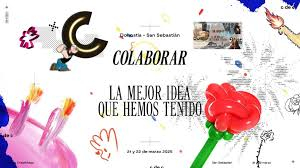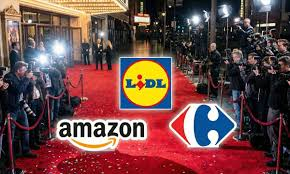 25 de març de 2025
25 de març de 2025La industria publicitaria se encuentra en un momento de inflexión, con los nuevos formatos, el auge de la IA y un mercado con cada vez más players redefiniendo las reglas del juego. Ante este panorama, algunas de las voces más influyentes del sector coinciden en que la clave para avanzar pasa por una colaboración auténtica. El c de c 2025, celebrado los días 21 y 22 de marzo, ha tenido como principal meta demostrar y analizar por qué hay que colaborar más y de qué modo hay que hacerlo para fortalecer el músculo creativo del sector.
Bajo el lema «Colaborar más, la mejor idea que hemos tenido», cada una de las ponencias aportó su granito de arena acerca de esta necesidad de romper con las paredes y los techos para tener una visión más amplia de lo que se está trabajando y tener espacio para vislumbrar en qué se puede convertir.
Hernán Casciari apeló en su ponencia a la parte más humana y emocional contando cómo sobrevivió a un infarto gracias a la «colaboración» de los anfitriones de la casa de Airbnb en la que estaba alojado, mientras que Fito Páez ilustró las luces y sombras de las colaboraciones en el ámbito musical y cómo hay que adaptarse y llegar a un punto común para que funcionen, sin perder nunca la identidad propia.
Eugenia Tenenbaum, historiadora del arte especializada en perspectiva de género, dejó claro que la desigualdad de género sigue persistiendo en esta industria, y que «es un problema de todos». «Quiero dirigirme especialmente a los hombres que estáis hoy aquí. Me vais a perdonar, pero no queremos que seáis nuestros aliados. Queremos que estéis en la lucha al mismo nivel, no nos estáis haciendo ningún favor, tenéis que estar porque esto os interese tanto como a nosotras, la creatividad, la publicidad, las marcas. Todos nos beneficiamos cuando hay diversidad de voces y de miradas», aseguró en su intervención.
Por su parte, Laia Grassi presentó los 10 mandamientos para la era de lA, y entre ellos se incluye el no temerle y aprender a colaborar con ella, cultivar habilidades humanas y utilizar la tecnología de manera ética y responsable. En contraste con esta exposición de ejemplos de trabajos con IA, la coach odontológica Brenda Cohen animó a todo el público del Kursaal a levantarse y bailar, en su objetivo de hacer entender que la expresión nace del diálogo, no de la mirada más individual.
La presentadora de televisión Minerva Piquero y Francisco Vaquero, director de Marketing Corporativo en Atresmedia, hicieron un repaso de la situación de la publicidad en la televisión, e instaron a buscar nuevos formatos para volver a conquistar a las marcas y estrechar lazos con estas, para recuperar la ilusión. De esas nuevas formas y romper un poco los moldes hablaron desde VICIO, que nos presentaron las claves de su éxito creativo.
Descubre los ganadores de los Premios Nacionales de Creatividad 2025
Las agencias y los anunciantes más premiados de los Premios Nacionales de Creatividad 2025
¿Cuál es la mejor forma de colaborar?
Mónica Moro, directora creativa de This is Libre, fue clara al respecto cuando le hicimos esta cuestión en el c de c: «Es de ley que estemos remando todos en la misma dirección». La creativa insistió en que la colaboración debe darse entre agencias y equipos para lograr proyectos más coherentes y procesos más eficaces.
Carlos Eiroa, director de Marca, Publicidad y Patrocinio de ASISA, insistió en romper las barreras entre departamentos creativos, estratégicos y comerciales: «Debería haber una colisión entre intereses y hacer colaboraciones mucho más creativas, con laboratorios de ideas y poner un poco en orden para que todo el mundo pueda aportar».
Para Jaime López-Francos, CEO de Dentsu Iberia, esta colaboración pasa inherentemente por una «generosidad real». «Esta industria tiene que pasar de la palabra y la literatura a la acción, creo que la colaboración es la generosidad, saber buscar partners correctos que lleven a las marcas más lejos, colaborar para dar más resultados a los clientes», defendió. Esta visión la respalda Francisco Vaquero, que agrega que hay que «estar dispuestos a hacer más pequeñitos los principios de la manera en la que hemos trabajado siempre, tener menos ego y menos miedo, colaborar y probar».
Acabar con los silos y más implicación de los directores de Marketing
«Estamos trabajando desde hace mucho en silos, y creo que es el mayor problema que tenemos desde hace décadas. Están los creativos por un lado, la tecnología por otro, los cuentas por otro, el paid media por otro. No hay proyectos en conjunto realmente, sino unión de piezas; eso no es colaboración. A nivel creativo nos hace perder efectividad», cuenta, por su parte, Alejandro Di Trolio. «Se trata de que tanto el lado del anunciante, el lado de agencia, los diferentes perfiles que hay, entre todos interactuemos cada vez más, y sobre todo con el intercambio generacional que está habiendo entre el pasado y el futuro de nuestro sector», apuntó Curro Palma, director general del c de c.
«Hay mucha más colaboración y transparencia fuera de las agencias creativas, esa competitividad en otros sectores es más sana, más verdadera y se llega más lejos», señaló Pepa Rojo, directora creativa de Meta Iberia.
«A mí me gustaría que los directores de marketing de las empresas para las que trabajamos vinieran y vieran nuestro trabajo y lo que hacemos en el c de c, porque eso les daría una visión más amplia, 360º, de las oportunidades y el potencial que tienen todas las agencias que están en el sector», apuntó María Bima, General Manager de Manifiesto Barcelona.
Poner en valor y defender las ideas y el talento creativo
Otro de los puntos en común fue la urgencia de poner en valor el trabajo creativo, tal y como desea Paco Mendoza, CEO de Publicis España: «Que todos trabajásemos a favor de que no se devalúe el valor de las ideas y, por tanto, la remuneración de estas». Mónica Moro también recaló en este punto. «Hay que colaborar para que los proyectos sean mucho más respetuosos, para que los fees sean realmente acordes al tiempo y cómo son los procesos de los concursos, hay que volver, para eso está el colaborar, no cada uno mirándose su ombligo, sus intereses más egoístas», afirmó.
Además, la directora creativa de This is Libre hizo un llamamiento a cuidar a las nuevas generaciones que están entrando en el sector: «Hay que mirar por ellos y seguir teniendo una industria sólida que está viendo cómo hay patas que se están cayendo». Aquí coincidió Aleix Puig, cofundador de VICIO, que fue claro sobre la importancia de valorar a los equipos. «La industria debería apostar por el talento a gas, por retenerlo, y para esto hay que pagar bien a la gente, hay que darle una calidad de vida buena, hay que dejar que la creatividad sea creatividad, porque a veces la pedimos pero no dejamos que se ejecute», explicó.
«La publicidad debiera de cambiar de paradigma«, aseguró Hernán Casciari. «Lo está haciendo en parte, pero todavía no da el gran salto al vacío, y ese cambio me da la impresión de que tiene que volver a ciertas fuentes de lo anterior a los altavoces, antes incluso de la invención de la radio. Recordar cómo vendíamos los brebajes para que nos crezca el pelo en 1820», remarcó.
Diversidad e inclusión como pilares creativos
Yan de Simone, fundadora y CEO de BI Universe, insistió en que las agencias deben ser más inclusivas y abrir los procesos creativos a nuevas miradas: «Las agencias, y los equipos creativos, necesitan de ese poder colaborativo, sobre todo en las mesas, en generar más diversidad, en entender que los procesos creativos se tienen que hacer con parte de esas audiencias, con esos colectivos, con estas comunidades y sobre todo con personas especialistas».
La escritora y ensayista Remedios Zafra nos acercó a una perspectiva ética y social de la colaboración. «La industria creativa tiene la gran ventaja de que parece muy articulada, parece que colaboráis más que en los sectores creativos del mundo artístico y cultural. Desde fuera se ve con cierta envidia, el que ya hay muchos lazos entre vosotros, pero es cierto que a veces se puede caer en la inercia de ver a los compañeros como rivales, de entender que todo en la industria está regido por el Dios supremo capital, y pienso que recordar que la industria está formada por personas que trabajan y cobran por sus trabajos creativos, personas que conviven y cuyos trabajos también afectan a la sociedad, generar colaboraciones para pensar sobre el sentido del trabajo que hacemos y la honestidad, es importante», declaró.
Fuente: https://www.marketingdirecto.com/especiales/c-de-c-club-creatividad/c-de-c-2025-rompiendo-barreras-creativas-construye-colaboracion-industria

La pregunta que sobrevuela las mesas de cualquier departamento de marketing hoy no es solo “¿cómo rankeamos en Google?”, sino “¿por qué ChatGPT no nos menciona?”. Existe la creencia de que si haces un buen SEO té...
Leer más...
A pesar de que las sucesivas polémicas que se están generando en los últimos meses a su alrededor, las redes sociales más seguidas del mundo siguen siendo vistas por las marcas como un gran soporte para dar visibilidad a sus campañas,...
Leer más...
La consultora estratégica de marketing digital Epsilon Technologies ha presentado, junto a la Asociación de Marketing de España (AMKT), el informe DAI Footprint 2025: Top-302 Marcas, en el que analiza cómo se reparte la atención digita...

A Instagram le encanta probar cosas nuevas, y sobre todo, le encanta probarlo con solo unos pocos para ver como funciona antes de lanzarlo “oficialmente”. Muchos usuarios y usuarias habituales de la plataforma (yo, entre ellas) nos hemos encontrado con un...

A pesar de las continuas explicaciones y actualizaciones, aún sigue habiendo muchas incógnitas alrededor del algoritmo de Instagram, especialmente sobre cómo mejorar el alcance e impactar a una audiencia más grande. A este respecto, tanto la...